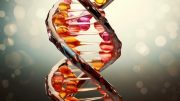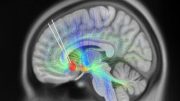
Genetic factors play a small but significant role in treatment-resistant depression (TRD), with notable genetic overlap with schizophrenia, attention deficit disorder, cognitive traits, and body mass index (BMI). Researchers used a machine-learning model to predict the likelihood of electroconvulsive therapy (ECT) in patients with major depressive disorder, revealing genetic loci linked to TRD. Their findings suggest new biological directions and potential treatments, especially regarding the inverse relationship between BMI and treatment resistance. Credit: SciTechDaily.com
Recent research highlights a genetic contribution to treatment-resistant depression, linking it with several health disorders and suggesting new treatment possibilities based on shared genetic factors.
Genetic influences play a small yet important role in severe depression that is resistant to conventional treatments, say researchers from Vanderbilt University Medical Center and Massachusetts General Hospital.
The heritability of treatment-resistant depression (TRD) was found to have significant genetic overlap with schizophrenia, attention deficit disorder, cognitive, alcohol and smoking traits, and body mass index (BMI), suggesting a shared biology and, potentially, new treatment avenues.
The report, published in The American Journal of Psychiatry, provides insights into the genetics and biology underlying TRD, supports the utility of estimating disease probabilities from clinical data for genomic investigations, and “lays the groundwork for future efforts to apply genomic data for biomarker and drug development.”
“Despite the large proportion of patients with TRD, the biology has remained poorly understood. Our work here provides genetic support for new biological directions to explore in addressing this gap,” said Douglas Ruderfer, PhD, associate professor of Medicine (Genetic Medicine), Psychiatry, and Biomedical Informatics.
“This work finally gives us some new leads, rather than reinventing the same antidepressants over and over again, for a condition that is extremely common,” said Roy Perlis, MD, professor of Psychiatry at Harvard Medical School and director of the MGH Center for Experimental Drugs and Diagnostics.
The Prevalence and Risk of TRD
Nearly 2 out of every 10 people in the United States experience severe depression, and roughly a third of them do not respond to antidepressant treatments and therapies. TRD is associated with a significantly increased risk for suicide.
Despite evidence that treatment resistance may be a heritable trait, the “genetic architecture” of this condition remains unclear, largely because of the lack of a consistent and rigorous definition of treatment resistance, and the challenge of recruiting enough research subjects to study.
To overcome these barriers, the researchers selected a surrogate for the condition — whether an individual diagnosed with major depressive disorder had received electroconvulsive therapy (ECT).
ECT applies a low voltage applied to the head to induce a generalized seizure without muscle convulsions. Approximately half of patients with TRD respond to ECT, which is thought to improve symptoms by stimulating “rewiring” of brain circuits after they are disrupted by the electrical current.
To ensure the study was sufficiently “powered,” or had enough patients from which valid results could be obtained, the researchers developed a machine-learning model to predict, from clinical information recorded in the electronic health record (EHR), which patients were most likely to receive ECT.
The researchers applied this model to EHRs and biobanks from Mass General Brigham and VUMC and validated the results by comparing the predicted cases to actual ECT cases identified through the Geisinger Health System in Pennsylvania, and the Million Veteran Program of the U.S. Department of Veterans Affairs.
More than 154,000 patients from the four health systems with medical records and genotypes, or sequences of their DNA samples, were included in a genome-wide association study, which can identify genetic associations with health conditions (in this case, a marker for TRD).
The study identified genes clustered in two locations, or loci, on different chromosomes that correlated significantly the likelihood of ECT predicted by the model. The first locus overlapped with a previously reported chromosomal location associated with body mass index (BMI).
Potential for Future Treatments
The ECT-BMI relationship was inverse—patients with lower body weight tended to be at higher risk for treatment resistance.
This finding is supported by studies that found patients with anorexia nervosa, an eating disorder characterized by extremely low body weight, are more likely than those with a higher BMI to be resistant to treatment of coinciding depression.
The other locus associated with ECT points to a gene that is highly expressed in brain regions that regulate body weight and appetite. Recently this gene also has been implicated in bipolar disorder, a major psychiatric illness.
Large studies are currently underway to collect tens of thousands of ECT cases for a case-control study.
Confirmation of the link between the ECT marker for TRD and the complex metabolic pathways underlying food intake, maintenance of body weight, and energy balance could open the door to new, more effective treatments for the treatment of major depressive disorder, the researchers said.
Reference: “Genome-Wide Association Study of Treatment-Resistant Depression: Shared Biology With Metabolic Traits” by JooEun Kang, Victor M. Castro, Michael Ripperger, Sanan Venkatesh, David Burstein, Richard Karlsson Linnér, Daniel B. Rocha, Yirui Hu, Drew Wilimitis, Theodore Morley, Lide Han, Rachel Youngjung Kim, Yen-Chen Anne Feng, Tian Ge, Stephan Heckers, Georgios Voloudakis, Christopher Chabris, Panos Roussos, Thomas H McCoy, Jr., Colin G. Walsh, Roy H. Perlis and Douglas M. Ruderfer, 15 May 2024, American Journal of Psychiatry.
DOI: 10.1176/appi.ajp.20230247
Co-authors from VUMC were JooEun Kang, MD, PhD, Michael Ripperger, Drew Wilimitis, Theodore Morley, Lide Han, PhD, Stephan Heckers, MD, MSc, and Colin G. Walsh, MD, MA; at MGH they included Thomas McCoy, MD, and Victor Castro.
This work was funded by National Institutes of Health grants R01MH116269, R01MH121455, R01MH116270, R01MH123804, 5T32GM007347, K08MH122911, R01MH125246, R01AG067025, U01MH116442, and R01MH109677, the VA, and the Brain & Behavior Research Foundation.









[“Despite the large proportion of patients with TRD, the biology has remained poorly understood.” “Despite evidence that treatment resistance may be a heritable trait, the “genetic architecture” of this condition remains unclear…”]
First and foremost, they are focusing on drug and genetic mutation research when the answer lies in diet. Next, despite about a decade of personal efforts to share what I’ve learned on my own as a lay victim, investigator, experimenter and discoverer, Vanderbilt University blocks my messages (a ‘class ceiling’), researchers at Harvard apparently don’t share what I share with them, and the Million Veteran Program is deliberately equally ignorant of my now senior lay American male findings. Perhaps worst of all, they are relying on AIs to discover what is best learned through life experiences (e.g., https://odysee.com/@charlesgshaver:d?view=about). Funding demonstrates again that when it comes to the US Government, the left hand (NIH/VA) doesn’t know what the right hand (FDA) is doing; how many unsuspecting Americans they are disabling and killing prematurely, for commercial pseudo-food profits.